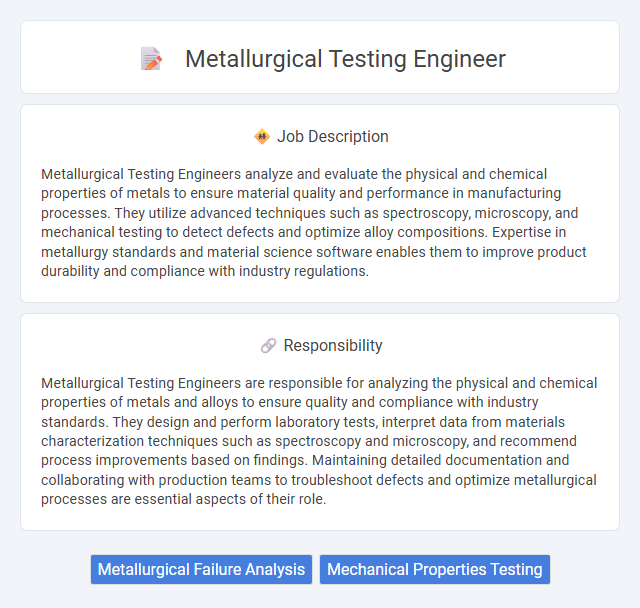
Metallurgical Testing Engineers analyze and evaluate the physical and chemical properties of metals to ensure material quality and performance in manufacturing processes. They utilize advanced techniques such as spectroscopy, microscopy, and mechanical testing to detect defects and optimize alloy compositions. Expertise in metallurgy standards and material science software enables them to improve product durability and compliance with industry regulations.
Candidates with strong analytical skills and a keen attention to detail are likely to be suitable for a Metallurgical Testing Engineer role, as it requires precise examination of metals and materials. Those who enjoy problem-solving and working in a lab or industrial environment may find this position aligns well with their interests and capabilities. Individuals who struggle with repetitive tasks or lack patience for meticulous testing processes might face challenges in adapting to the demands of this job.
Qualification
A Metallurgical Testing Engineer must possess a degree in Metallurgical Engineering, Materials Science, or a related field, often complemented by certifications in non-destructive testing (NDT) or quality assurance. Proficiency in advanced testing methods such as tensile, hardness, impact, and microstructural analysis is essential to ensure material performance and safety. Strong knowledge of metallurgical principles, standards like ASTM or ISO, and experience with laboratory instrumentation enhance the engineer's ability to conduct precise evaluations and support product development.
Responsibility
Metallurgical Testing Engineers are responsible for analyzing the physical and chemical properties of metals and alloys to ensure quality and compliance with industry standards. They design and perform laboratory tests, interpret data from materials characterization techniques such as spectroscopy and microscopy, and recommend process improvements based on findings. Maintaining detailed documentation and collaborating with production teams to troubleshoot defects and optimize metallurgical processes are essential aspects of their role.
Benefit
Metallurgical Testing Engineers likely experience significant benefits including enhanced career growth opportunities due to their specialized skills in material analysis and failure investigation. They probably enjoy competitive salaries and access to cutting-edge technology, making their roles both financially rewarding and intellectually stimulating. Working in this field may also offer exposure to diverse industries such as aerospace, automotive, and construction, expanding their professional network and expertise.
Challenge
Metallurgical Testing Engineer roles likely involve complex problem-solving challenges related to material properties and quality assurance. Engineers probably face difficulties in accurately analyzing metals under varying conditions to ensure compliance with industry standards. The role demands continuous adaptation to evolving technologies and testing methodologies, presenting ongoing technical challenges.
Career Advancement
A Metallurgical Testing Engineer specializes in analyzing metal properties through advanced techniques like spectroscopy and mechanical testing to ensure material quality and compliance with industry standards. Career advancement often leads to roles such as Senior Metallurgical Engineer, Quality Assurance Manager, or Research and Development Director, leveraging expertise in failure analysis and process optimization. Mastery in metallurgy software and certifications like ASM or NACE significantly enhance promotion prospects within manufacturing, aerospace, and automotive sectors.
Key Terms
Metallurgical Failure Analysis
Metallurgical Testing Engineers specializing in metallurgical failure analysis utilize advanced techniques like scanning electron microscopy (SEM), X-ray diffraction (XRD), and energy-dispersive X-ray spectroscopy (EDS) to identify root causes of material failures. They analyze microstructures, mechanical properties, and chemical compositions to detect defects such as corrosion, fatigue, or cracking in metals and alloys. Their expertise is crucial for improving product durability, ensuring safety standards, and optimizing manufacturing processes in industries like aerospace, automotive, and oil and gas.
Mechanical Properties Testing
Metallurgical Testing Engineers specialize in evaluating the mechanical properties of metals and alloys, including tensile strength, hardness, impact resistance, and fatigue life, to ensure material performance meets industry standards. They utilize advanced equipment such as universal testing machines, hardness testers, and impact testers to conduct precise and reliable assessments. Expertise in analyzing stress-strain behavior and fracture mechanics is crucial for guaranteeing structural integrity in applications across aerospace, automotive, and construction sectors.
 kuljobs.com
kuljobs.com